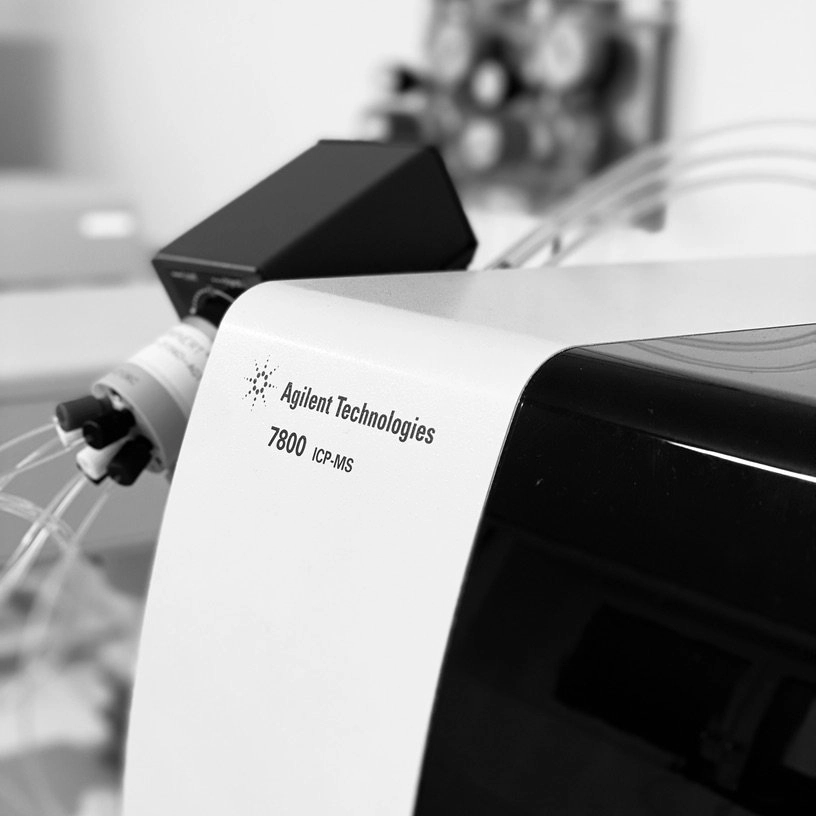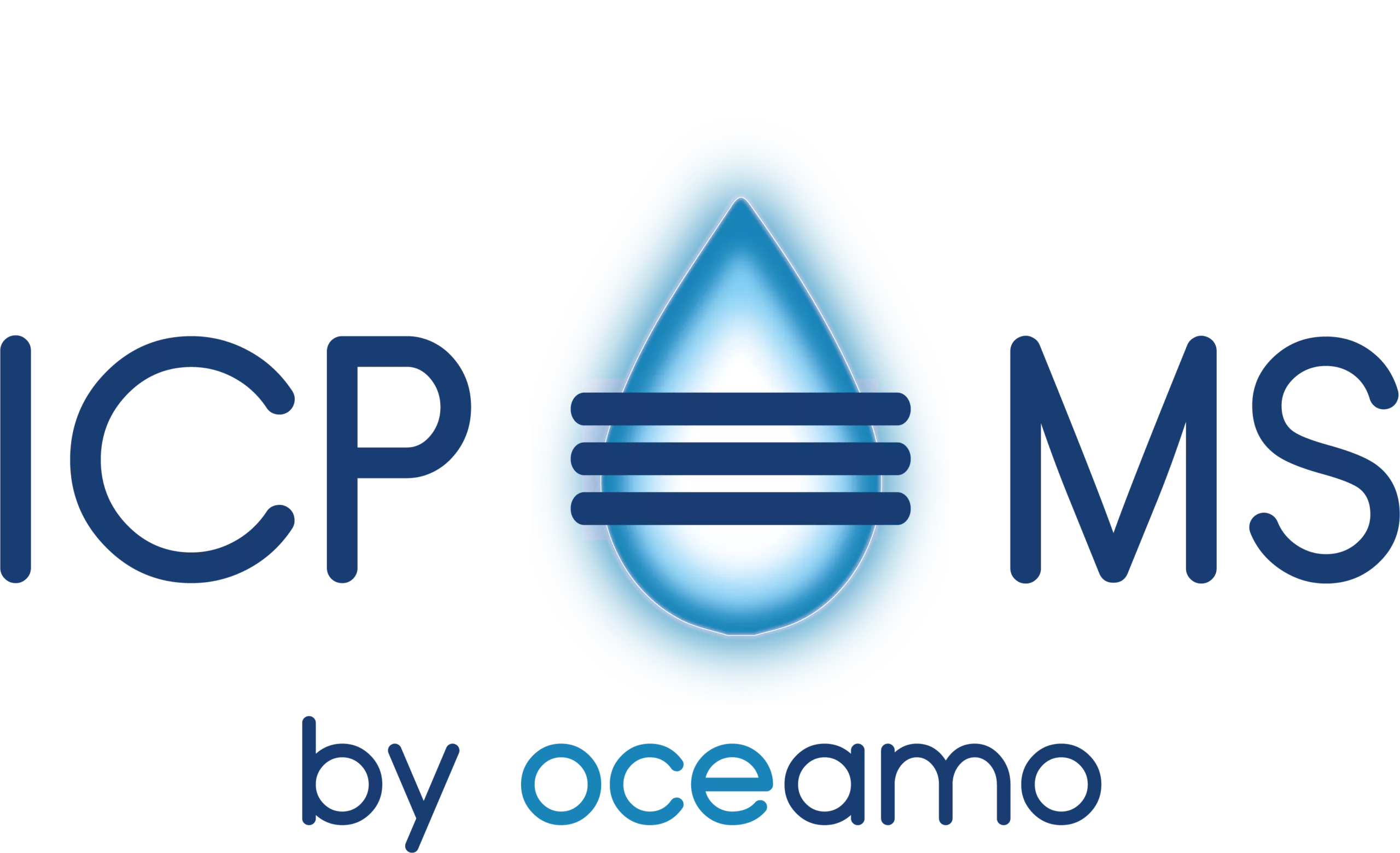Water analyses
Our water analyses are carried out with scientific methodology and accuracy. We take the time to evaluate and explain the results. – You don’t need to be a chemist to understand and use Oceamo analyses.
We combine various analytical methods with specialist knowledge and personal advice. This will create a “chemical fingerprint” of your aquarium and together we can optimize it by adjusting the water parameters. With our ICP-OES we can reliably analyze a large part of the essential bulk elements, trace elements and pollutants in the probes. With our IC (including conductivity and UV detection), we can also reliably measure fluoride, nitrate and nitrite in extremely low concentrations. Salinity is measured with a conductivity probe and alkalinity (KH) is determined titrimetrically. In addition, we measure phosphate using a sensitive photometric method, which means that this important parameter is determined precisely.

Since the end of 2021 Agilent ICP-MS (ICP with mass spectroscopy) has been added to our equipment pool. Using ICP-MS, trace elements and potentially harmful heavy metals can be detected in significantly lower concentrations than with ICP-OES.This means that deficiencies can be reliably detected and compensated for even in ultra-trace elements such as tin, cobalt, copper, chromium and selenium..


But our expertise does not end with ICP-MS. We combine this leading technology with a wide range of established methods such as ICP-OES, ion chromatography, as well as specialized measurements for salinity, alkalinity and phosphate. This comprehensive approach ensures that every aspect of your water sample is accurately recorded.


At Oceamo, we understand that complex analyses need clear explanations. That’s why we take the time not only to provide you with data, but also to make it understandable.
Rely on our expertise and state-of-the-art technology,
to ensure the health and balance of your aquarium.
ICP-MS Seawater Analysis
Use the ICP-MS Analysis to get a much more detailed view
about pollutants and trace elements in your aquarium.
With the Oceamo ICP-MS, your seawater analysis is carried out with ICP-MS (instead of ICP-OES). ICP-MS (ICP with mass spectrometry) is significantly more sensitive and offers up to 10,000 times lower detection limits than ICP-OES.
This results in the following key advantages:
We measure these parameters using ICP-MS seawater analysis:
| Basic parameters: | Alkalinity (KH), salinity, SAK254 |
| Quantitative elements: | Boron, bromide, calcium, chloride, potassium, magnesium, sodium, strontium, sulphate |
| Trace elements: | Barium, chromium, cobalt, cesium, iron, fluoride, iodine, copper, lithium, manganese, molybdenum, nickel, rubidium, selenium, vanadium, zinc, tin |
| Pollutants: | Aluminum, antimony, arsenic, beryllium, bismuth, lead, cadmium, cerium, gallium, lanthanum, mercury, neodymium, thallium, tellurium, titanium, ruthenium, thorium, tungsten, uranium |
| Nutrients: | Nitrate, nitrite, phosphate (photometric), silicon |
| Basic parameters: | Alkalinity (KH) Salinity SAK254 |
| Bulk elements: | Boron Bromide Calcium Chloride Potassium Magnesium Sodium Strontium Sulphate |
| Trace elements: | Barium Chromium Cobalt Caesium Iron Fluoride Iodine Copper Lithium Manganese Molybdenum nickel |
| Pollutants: | Aluminium Antimony Arsenic Beryllium Bismuth Lead Cadmium Cerium Gallium Lanthanum Mercury Neodymium Thallium Tellurium Titanium Ruthenium Thorium Wolfram Uranium |
| Nutrients: | Nitrate Nitrite Phosphate (photometric) Silicon |
As part of the ICP-MS seawater analysis, we analyze your osmosis water for the “frequent problem causes” copper, zinc and silicon free of charge.
We recommend the ICP-MS seawater analysis in any case for problems in the tank, as well as at regular intervals to evaluate the trace element status.
Use our Oceamo Lab Classic analysis to determine all essential chemical parameters in the reef aquarium. This creates a ‘chemical fingerprint’ of your aquarium and together we can optimise your aquarium by adjusting the water parameters.
We measure these parameters with the Classic seawater analysis:
| Basic parameters: | Alkalinity (KH), salinity |
| Quantitative elements: | Boron, bromide, calcium, chloride, potassium, magnesium, sodium, strontium, sulphate |
| Trace elements: | Barium, chromium, cobalt, iron, fluoride, iodine, copper, lithium, manganese, molybdenum, nickel, rubidium, selenium, vanadium, zinc, tin |
| Pollutants: | Aluminum, antimony, arsenic, beryllium, bismuth, lead, cadmium, mercury, lanthanum, titanium, thallium, uranium |
| Nutrients: | Nitrate, nitrite, phosphate (photometric), silicon |
| Osmosis Check: | Copper, zinc, silicon |
| Basic parameters: | Alkalinity (KH) Salinity |
| Bulk elements: | Boron Bromide Calcium Chloride Potassium Magnesium Sodium Strontium Sulphate |
| Trace elements: | Barium Chromium Cobalt Iron Fluoride Iodine Copper Lithium Manganese Molybdenum Nickel Rubidium Selenium Vanadium Zinc Tin |
| Pollutants: | Aluminum Antimony Arsenic Beryllium Bismuth Lead Cadmium Mercury Lanthanum Titanium Thallium Uranium |
| Nutrients: | Nitrate Nitrite Phosphate (photometric) Silicon |
| Osmosis Check: | Copper Zinc Silicon |
As part of the Classic seawater analysis, we test your osmosis water for the “frequent problem causes” copper, zinc and silicon free of charge.
We recommend having an Oceamo Lab Classic analysis carried out routinely every 2-3 months. This allows you to detect any accumulation of pollutants (e.g. from corroded technical components) and take countermeasures before the effects on living organisms become visible.
Together we can also identify missing (trace) elements in your water and specifically correct the deficits to further improve the health, coloration and growth of your corals. With our Custom Elements, we produce a custom-made product for your aquarium, which corrects all the deficiencies identified in the analysis to the ideal value in your tank.
Frequently requested and now available: ICP-OES, ion chromatography, KH titration and conductivity measurement are used to determine all relevant parameters (including nitrite) in your freshwater aquarium.
It is also possible to upgrade the Oceamo analysis for freshwater to the significantly more sensitive ICP-MS measurement.
This allows you to detect deficiencies and accumulations and optimize fertilization and aquarium maintenance.
As part of the analysis for freshwater, we will test your osmosis water for the “frequent problem causes” copper, zinc and silicon free of charge.
As usual with Oceamo: With detailed personal interpretation of the results.
We measure these parameters with the freshwater laboratory analysis:
| Main parameters: | Conductivity, alkalinity (carbonate hardness) |
| Quantitative components: | Boron, bromide, calcium, chloride, potassium, magnesium, sodium, strontium, sulphate |
| Trace elements: | Barium, chromium, cobalt, iron, fluoride, iodide, copper, lithium, manganese, molybdenum, nickel, phosphorus, rubidium, selenium, vanadium, zinc, tin |
| Pollutants: | Aluminum, antimony, arsenic, beryllium, bismuth, lead, cadmium, lanthanum, mercury, thallium, uranium |
| Nutrients: | Nitrate, nitrite, phosphate, silicon |
| Main parameters: | Conductivity Alkalinity (KH) |
| Volume components: | Boron Bromide Calcium Chloride Potassium Magnesium Sodium Strontium Sulphate |
| Trace elements: | Barium Chromium Cobalt Iron Fluoride Iodid Copper Lithium Manganese Molybdenum Nickel Phosphorus Rubidium Selenium Vanadium Zinc Tin |
| Pollutants: | Aluminum Antimony Arsenic Beryllium Bismuth Lead Cadmium Lanthanum Mercury Thallium Uranium |
| Nutrients: | Nitrate Nitrite Phosphate Silicon |
Of course we also measure pure water (osmosis water) for you. This analysis can also be used to check the suitability of tap water for aquarium use. At Oceamo, we do not run these samples “on the side”, but give them our full attention, because problems in reef aquaria often arise from the treatment of the source water.
Our devices are specially calibrated for your pure water samples, and we analyze your sample for all relevant chemical parameters. – Our detailed evaluation focuses on assessing the suitability of your water for aquaristics and making suggestions for improving the water treatment.
We measure these parameters using pure water laboratory analysis:
| Quantitative elements: | Boron, bromide, calcium, chloride, potassium, magnesium, sodium, strontium, sulphate |
| Trace elements: | Barium, chromium, iron, fluoride, iodine, cobalt, copper, lithium, manganese, molybdenum, nickel, phosphorus, rubidium, selenium, vanadium, zinc, tin |
| Pollutants: | Aluminum, antimony, arsenic, beryllium, bismuth, lead, cadmium, lanthanum, mercury, thallium |
| Nutrients: | Nitrate, nitrite, silicon |
| Bulk elements: | Boron Bromide Calcium Chloride Potassium Magnesium Sodium Strontium Sulphate |
| Trace elements: | Barium Chromium Iron Fluoride Iodine Cobalt Copper Lithium Manganese Molybdenum Nickel Phosphorus Rubidium Selenium Vanadium Zinc Tin |
| Pollutants: | Aluminum Antimony Arsenic Beryllium Bismuth Lead Cadmium Lanthanum Mercury Thallium |
| Nutrients: | Nitrate Nitrite Silicon |
Oceamo sampling kits contain high-purity sample tubes (suitable for trace analysis). Sampling for aquarium water analysis involves 0.22 µm syringe filtration: this filters out microorganisms and particles from the water that could otherwise influence the result of the measurement.
Sampling kits for seawater and ultrapure water analysis can be found in specialist shops and in our webshop.
You can also find the current descriptions for sampling here
Do you have special analytical questions that are not covered by the standard analyses?
Contact us, we will be happy to advise you.
The following analytical techniques are available in the Oceamo laboratory:







